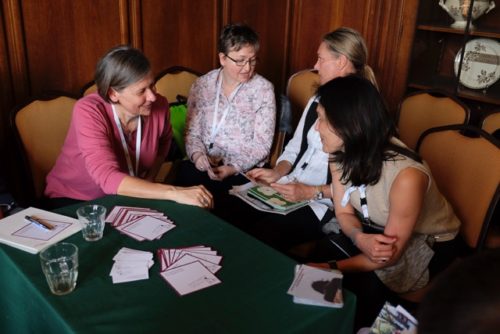Intercultural training: my true passion
I wrote this on the train that took me back to Milan from Bologna, where I had gone to give an intercultural training to a family from the USA.
I practice Linguistic Empathy and I expect you to do the same. Please bear with me if my English is not perfect.
When I was living in Indonesia, I gave a lot of intercultural training, but moving back to Europe the occasions decreased.
Today I went to Bologna to give an intercultural training to a family relocating from the USA. Once more I realized how deeply I love this kind of work.
When I tell people about my intercultural training, they suppose I will give a presentation of the local culture, or provide a list of tips and trick on how to move around once they arrive. They have a hard time understanding that intercultural training is not pouring on people lots of data on a specific culture or practicalities on a place.
 First of all, there is the connection between human beings. Even if it is only for one, sometimes two days, sitting and working together on such important topics creates an intimacy that is very special. Clients open up on their uncertainties. Imagine arriving at a table for a game without knowing the rules. What’s at stake is something very important for you, but you are not sure whether you move in the right direction or you commit the biggest faux-pas. It is a stressful feeling, and one that makes you feel exposed and vulnerable.
First of all, there is the connection between human beings. Even if it is only for one, sometimes two days, sitting and working together on such important topics creates an intimacy that is very special. Clients open up on their uncertainties. Imagine arriving at a table for a game without knowing the rules. What’s at stake is something very important for you, but you are not sure whether you move in the right direction or you commit the biggest faux-pas. It is a stressful feeling, and one that makes you feel exposed and vulnerable.
I love this space of vulnerability that forms between the client and the intercultural trainer. Here, all senses are alert, whatever you say goes deep. For a precious time, the focus is on the connection: the client eagerly wants to receive, the trainer feels privileged to be able to give.
My intercultural training are lively and interactive. I have made a point of perfecting them in this direction. I love playing, and it is in the framework of games that I give my best. I also know for experience that people are more likely to remember things and to open up when they play or interact on practical activities.
Sometimes this does not happen. I have rarely come across clients in my intercultural training who expected a lot of theory and wanted to be “taught” instead of engaging themselves in simulations and games. And this is the other part I absolutely love of intercultural training: you have no way of knowing how the interaction will go.
Precisely for the interactive nature of intercultural training, every experience is different, and the part where you test your client, where you dare a bit to force his or her assumptions, where you balance how much of what to throw on the table, is for me absolutely energizing.
And then of course there is amazing feeling of talking of the fundamentals of human interactions. By providing tools to improve intercultural competence, you discuss the basics of human cohabitation on this planet. And this is enormous.

Finally, what I absolutely love of being an intercultural trainer, is that the learning experience is reciprocal and equally enriching for the client and the trainer. During an intercultural training the leitmotiv is culture, with all this concept implies. The “mode” of communication is based on the comparison between two (sometimes more) sets of ways of viewing and managing life. In this flow of exchange about how we do things, why we do them the way we do, and what is missing to bridge the gap between the different ways of managing interactions, we constantly learn both about new situations, different ways of relating to life, traditions and habits of far away cultures. This is deeply rewarding.
I am exhausted. In most cases an intercultural training means speaking of and listening to complex concepts and feelings in another language – English, usually, as it was today. Besides, this is the only occasion when I do not allow myself to shift my focus on something else, or to be distracted. For eight hours I am a 100% concentrated on what I say and what I listen to. There is no other moment in my professional life when I feel so tired as when I finish an intercultural training. But so far, I have not known an equally fascinating, fulfilling and absolutely rewarding experience.
Claudia Landini
February 2019
Photos: Pixabay

